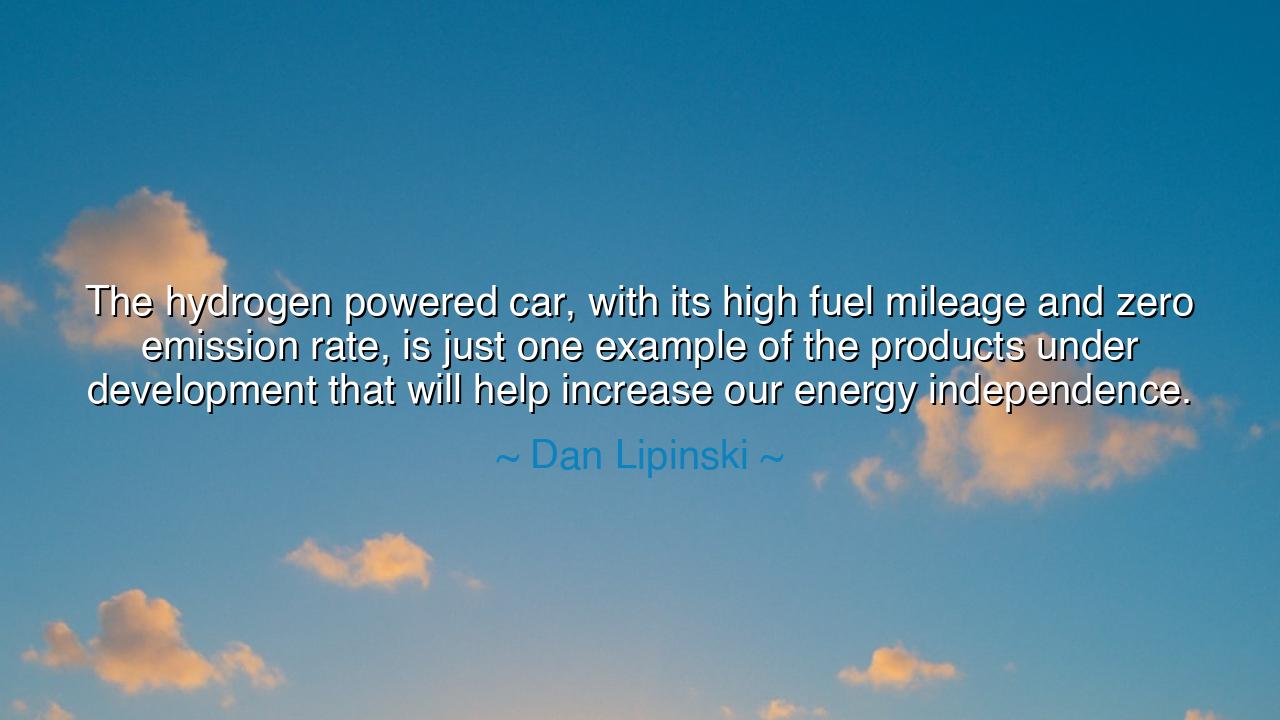
The hydrogen powered car, with its high fuel mileage and zero
The hydrogen powered car, with its high fuel mileage and zero emission rate, is just one example of the products under development that will help increase our energy independence.






“The hydrogen powered car, with its high fuel mileage and zero emission rate, is just one example of the products under development that will help increase our energy independence.” Thus spoke Dan Lipinski, a man of vision and faith in progress, calling upon his generation to look beyond the horizon of convenience and into the future of responsibility. His words, though anchored in science, resonate with a moral depth that transcends the mechanics of industry. For in them lies not only a vision of technology, but a summons to wisdom—a plea that humanity learn once again to live in harmony with the forces that sustain it. Lipinski reminds us that innovation is not the mere pursuit of comfort, but the pathway to independence, both as a nation and as a civilization.
The origin of this quote lies in the great challenge of our age—the struggle for energy independence, a battle as defining in our time as wars once were in centuries past. Lipinski, a congressman and advocate for sustainable progress, spoke these words amid debates on energy policy in the early twenty-first century, when the world stood at a crossroads between dependence on fossil fuels and the dawning promise of renewable power. The hydrogen powered car, a symbol of that promise, stood as a beacon of what could be: a creation of human intellect that nourished rather than destroyed, that freed rather than enslaved. It was not merely a machine—it was an emblem of hope, proof that science, guided by conscience, could restore balance to the Earth.
But to understand Lipinski’s words, one must see beyond the metal and motion of the hydrogen car. Its deeper meaning lies in the eternal struggle between dependence and freedom. Since the first flame was kindled in a cave, humanity has relied on the gifts of the Earth—fire, water, wind, and oil. Yet in that reliance, we have too often grown careless, mistaking consumption for mastery. The nations of the modern age found themselves bound, not by chains of iron, but by the chains of energy dependence—oil drawn from distant lands, controlled by foreign powers, purchased at the cost of both treasure and blood. Thus, to pursue energy independence was not merely a technical goal—it was an act of sovereignty, a reclaiming of destiny.
Lipinski’s vision recalls the spirit of the great builders and reformers of old. Consider the example of Thomas Edison, who illuminated the world not simply with the light bulb, but with an idea—that human ingenuity could harness nature for the good of all. Or of Teddy Roosevelt, who preserved the wilderness even as industrialization spread, knowing that true progress must honor creation rather than exhaust it. In this lineage stands Lipinski, urging us to see that the next chapter of civilization will be written not by conquest, but by innovation—by the courage to create clean energy that liberates both the planet and the people.
There is poetry in the concept of hydrogen itself—the simplest of elements, the very breath of the stars. From the same atom that fuels the sun, mankind seeks to fuel its future. What once was the fire of the heavens may now power the engines of Earth, transforming our cities from polluters into stewards. This is no small dream. It is the continuation of the human journey: from dependence upon brute nature, to mastery guided by wisdom, to harmony born of understanding. For the true goal is not domination of energy, but communion with it—to use without abuse, to consume without corruption.
Yet Lipinski’s insight carries a warning as well. To achieve energy independence is not the work of governments alone, but of every citizen. The path toward sustainability demands sacrifice, foresight, and collective will. It is a calling for each of us to reconsider how we live—to waste less, to conserve more, to honor the resources that make our comfort possible. Every act of mindfulness—every electric car, every solar panel, every choice to walk instead of drive—is a thread in the great tapestry of independence. For the fate of nations begins in the habits of their people.
Let this, then, be the lesson passed down to future generations: that independence—whether political, economic, or environmental—is not a gift inherited, but a discipline earned. Just as the founders of nations fought for freedom from tyranny, so too must the citizens of the modern world fight for freedom from dependence—on dwindling resources, on polluting habits, on the inertia of the past. The hydrogen powered car is but a symbol of this awakening—a reminder that human greatness lies not in what we take from the world, but in what we give back.
So, O listener, remember these words of Lipinski: progress is not measured by speed or power, but by balance and endurance. To build a future worthy of our children, we must be both inventors and guardians, visionaries and caretakers. Let the fires of the Earth rest, and let the stars teach us anew—how to draw light without smoke, how to move without harm, how to live in independence without arrogance. For the age of wisdom begins not when we conquer energy, but when we learn to walk beside it in harmony, carrying forward the promise of both freedom and sustainability into the dawn of a new world.






AAdministratorAdministrator
Welcome, honored guests. Please leave a comment, we will respond soon